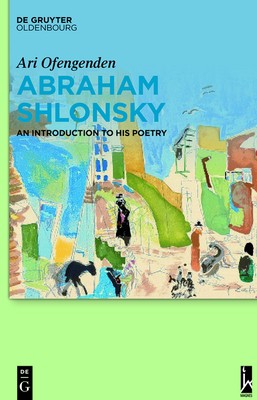
- We will send in 10–14 business days.
- Author: Ari Ofengenden
- Publisher: Walter de Gruyter
- Year: 2014
- Pages: 234
- ISBN-10: 3110350610
- ISBN-13: 9783110350616
- Format: 15.6 x 23.4 x 1.4 cm, hardcover
- Language: English
- SAVE -10% with code: EXTRA
Reviews
Description
The poet Abraham Shlonsky (1900-1973) can be regarded as the main architect of Jewish Modernism and Hebrew secular culture. In his crucial contribution, Ari Ofengenden disentangles Shlonsky's work from Zionist readings and shows how his poetics redeem experiences of radical political displacement, exile and alienation through the use of a precise, chiseled yet playfully enigmatic style. Writing on immigrants, refugees and urban outcasts following the traumatic events of the First World War and the Civil War in Russia, his poetry constitutes a fusion of Modernist European poetry with biblical and rabbinic sources with the influences of Georg Trakl and Rimbaud. The book situates Shlonsky's poetry in the context of his "rebellion" against the romantic poetry of C.N. Bialik and as an active participant in the European styles of Symbolism and Expressionism. The book is indispensable for understanding Modern Hebrew and Jewish culture, and more generally as an exemplar of today's more prevalent hybridizations of tradition and modernity.
EXTRA 10 % discount with code: EXTRA
The promotion ends in 10d.01:46:21
The discount code is valid when purchasing from 10 €. Discounts do not stack.
- Author: Ari Ofengenden
- Publisher: Walter de Gruyter
- Year: 2014
- Pages: 234
- ISBN-10: 3110350610
- ISBN-13: 9783110350616
- Format: 15.6 x 23.4 x 1.4 cm, hardcover
- Language: English English
The poet Abraham Shlonsky (1900-1973) can be regarded as the main architect of Jewish Modernism and Hebrew secular culture. In his crucial contribution, Ari Ofengenden disentangles Shlonsky's work from Zionist readings and shows how his poetics redeem experiences of radical political displacement, exile and alienation through the use of a precise, chiseled yet playfully enigmatic style. Writing on immigrants, refugees and urban outcasts following the traumatic events of the First World War and the Civil War in Russia, his poetry constitutes a fusion of Modernist European poetry with biblical and rabbinic sources with the influences of Georg Trakl and Rimbaud. The book situates Shlonsky's poetry in the context of his "rebellion" against the romantic poetry of C.N. Bialik and as an active participant in the European styles of Symbolism and Expressionism. The book is indispensable for understanding Modern Hebrew and Jewish culture, and more generally as an exemplar of today's more prevalent hybridizations of tradition and modernity.


Reviews